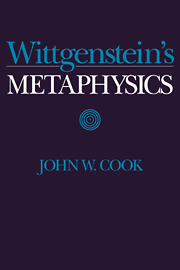Book contents
- Frontmatter
- Contents
- Preface
- List of Abbreviations
- Introduction
- Part I From Idealism to Pure Realism
- Part II The Metaphysics of Wittgenstein's Later Philosophy
- Part III Causation and Science in a Phenomenal World
- Part IV Logical Possibilities and the Possibility of Knowledge
- Part V The Past, Memory, and The Private Language Argument
- 16 Memory, Tenses, and the Past
- 17 Wittgenstein's Analysis of Mental States and Powers
- 18 Following A Rule
- 19 The Private Language Argument
- 20 Names of Sensations and the Use Theory of Meaning
- Name Index
- Subject Index
16 - Memory, Tenses, and the Past
Published online by Cambridge University Press: 05 November 2011
- Frontmatter
- Contents
- Preface
- List of Abbreviations
- Introduction
- Part I From Idealism to Pure Realism
- Part II The Metaphysics of Wittgenstein's Later Philosophy
- Part III Causation and Science in a Phenomenal World
- Part IV Logical Possibilities and the Possibility of Knowledge
- Part V The Past, Memory, and The Private Language Argument
- 16 Memory, Tenses, and the Past
- 17 Wittgenstein's Analysis of Mental States and Powers
- 18 Following A Rule
- 19 The Private Language Argument
- 20 Names of Sensations and the Use Theory of Meaning
- Name Index
- Subject Index
Summary
In this chapter and those that follow we will be concerned with Wittgenstein's argument against the possibility of a private language. Among Wittgenstein scholars there is no topic more hotly debated than the nature – and validity – of this argument, and many versions of it have been offered by both his detractors and his disciples. No one, however, has recognized that his argument depends on the following aspects of Wittgenstein's philosophy: (i) his reductionist accounts of memory and the past; (ii) his attack on intellectual capacities, such as the capacity to learn and retain what one has learned; and (iii) his conclusion from (i) and (ii) that in order to hold that the use of a word such as “red” or “pain” is rule-governed, it is necessary to accept a reductionist account of “same color” (or “same sensation”). The first of these aspects will be elucidated in the present chapter. The remaining two aspects will be dealt with, respectively, in Chapters 17 and 18. In Chapter 19 these will be shown to be the basis of Wittgenstein's private language argument.
Solipsism of the Present Moment
Philosophers have had difficulty understanding Wittgenstein's private language argument because his views about time and memory have gone largely unnoticed or been misunderstood. To understand these views, we must begin by seeing what prompted them. As with so many of his other views, it was a form of skepticism that led him to embrace a peculiar view of time and memory.
- Type
- Chapter
- Information
- Wittgenstein's Metaphysics , pp. 239 - 268Publisher: Cambridge University PressPrint publication year: 1994



